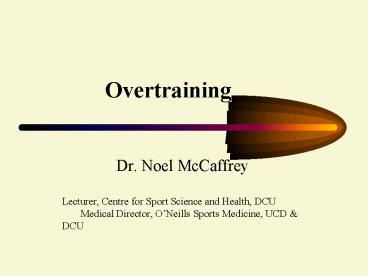Overtraining PowerPoint PPT Presentation
1 / 25
Title: Overtraining
1
Overtraining
- Dr. Noel McCaffrey
- Lecturer, Centre for Sport Science and Health,
DCU Medical Director, ONeills Sports Medicine,
UCD DCU
2
overtraining
- the training / preparation challenge
- what is the overtraining syndrome
- do we understand the mechanism?
- recognition
- treatment and prevention
3
overtraining
- the training / preparation challenge
- what is the overtraining syndrome
- do we understand the mechanism?
- recognition
- treatment and prevention
4
overtraining
- the training / preparation challenge
- what is the overtraining syndrome
- do we understand the mechanism?
- recognition
- treatment and prevention
5
overtraining
- the training / preparation challenge
- what is the overtraining syndrome
- do we understand the mechanism?
- recognition
- treatment and prevention
6
training areas
- Resistance
- choice of exercise
- order of exercise
- volume (sets x reps)
- intensity ( rep max)
- rest (between sets)
- Speed
- speed generation
- repeat speed
- Endurance
- central adaptation
- peripheral (sport specific) adaptation
- cross training (injured)
Skills technique repetition
Team play
7
the challenge
- provide continuous training stimulus with
adequate variety, recovery, progression to - facilitate optimum performance at the right
time(s) - avoid OTS
- minimise injury
8
the overtraining syndrome
h
- a condition characterised by
- ? performance in training / competition (incl
technical) - ? effort required to deliver same performance
- failure to show progression / improvement
- despite maintained or increased training
9
- overtraining process ? overtraining syndrome
- other words
- staleness overwork
- burnout chronic fatigue
- overfatigue overstrain
10
inadequate recovery
Fitness Level
Session 1
Session 2
Session 3
Days
11
over-reaching training stimulus
? inadequate recovery ? repeated (
?) training ? ?
performance ? rest
? full recovery in 2-3weeks
overload training stimulus ? adequate
recovery ? training increase (appropria
te) ? ? performance
overtraining training stimulus
? inadequate recovery ? repeated (
?) training ? ?
performance ? no recovery with rest
12
prevalence of OT
- signs and symptoms of OT seen in
- ? 60 distance runners over a career
- ? 50 pro soccer players in a 5 month competitive
season - 33 basketball players in a 6 week training camp
13
common symptoms of OTS
- general fatigue
- malaise
- ? energy (malaise)
- ? enthusiasm
- ? motivation
- irritable / restless
- anxious
- appetite change
- weight loss
- depression
- ? focus / concentration
14
diagnostic difficulties
- diagnosis of exclusion
- different symptoms with
- different individuals doing same same training
- acute vs chronic ? performance
- ? volume vs ? intensity
- sympathetic vs parasympathetic models
- endurance vs anaerobic overtraining
15
parasympathetic overtraining
- volume overload (resistance or endurance)
- ? testosterone cortisol ratio
- fatigue
- depression
- apathy
- ? resting HR
16
sympathetic overtraining
- intensity overload
- insomnia
- irritability
- restlessness
- ? HR
- ? blood pressure
17
overuse injuries
- dinternal factors
- boy mass
- biomechanics
- nutrition
- technique
- fatigue
- external factors
- training volume
- training intensity
- repetition
- footwear
- surface
- equipment
18
what causes it?
- training ?imbalance / mismatch
- ? recovery
- exercise ? ? exercise capacity
- stress ? ? stress tolerance
19
initiating events
- voulme ? / intensity of training
- monotony of training
- illness (disease / infection)
- caloric restriction / ? carbohydrate intake
- iron deficiency
- exercise-heat stress
- personal / emotional problems
- occupational stress
20
biological markers
- ? blood constitiuents
- haemoglobin / hematocrit
- white cells
- iron
- blood lactate in submax / max exercise
- testosterone / cortisol
- catecholamines (resting / nocturnal)
- cardiorespiratory
- ? resting / max heart rate
- ?VO2max
- ? heart rate / VO2 / VE during exercise
- ? basal metabolic rate
- ? infection
21
immune system
- ? upper respiratory tract infection in OR / OT
athlethes - cause or effect?
22
causes common of persistent fatigue and
underperformance in sport
- less common
- dehydration
- diabtees
- eating disorders
- hepatitis
- hypothyroidism
- postconcussion
- substance abuse
- lr resp tract infection
- side effects of
- meds / supplements
- nutrition
- ? carbo / protein
- caffeine withdrawal
- allergies
- ex-induced asthma
- ? sleep
- ? iron (/- anaemia)
- performance anxiety
- infection
- mononucleosis
- upp. resp tract infection
- OTS
- mood disorder
- anxiety / depression
- rare
- endocrine disease
- ? or ? adrenal gland
- heart disease
- HIV
- malabsorption
- lung disease
- malignancy
- renal disease
- neuromuscular disease
23
fatigue
- What is it
- failure to generate or maintain desired exercise
intensity - peripheral mechanism (fuel depletion)
- central mechanisms (? brain serotonin)
- core symptom of many illnesses
- atiguFe in illness
- viral illness
- anaemia
- hypothyroidism
- hypoglycaemia
- chronic fatigue syndrome
- depression
24
OTS and Major Depression
- ? appetite
- irritable / restless
- ? body weight
- ? motivation
- ?interest / pleasure
- ? general fatigue / malaise
- concentration
- feeling hopeless / worthless
- feeling sad
- persistent physical symptoms that fail to respond
- suicidal thoughts
25
Treatment and Prevention
- ? recovery days
- periodise
- ? variety
- ensure vol intensity inverse relationship
- avoid high intensity over prolonged period
- avoid high intensity over prolonged period
- in resistence sessions, avoid completing every
set of every exercise in every session - avoid overworking one area
- avoid excess eccentric work
? role for antidepressant medication

